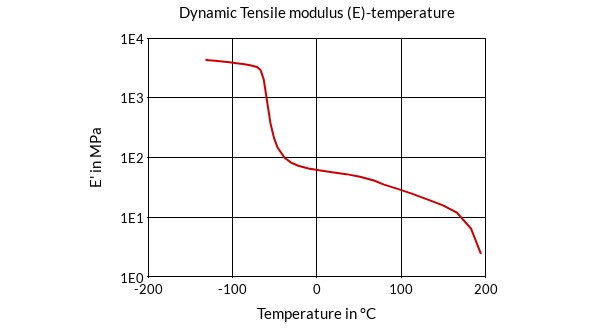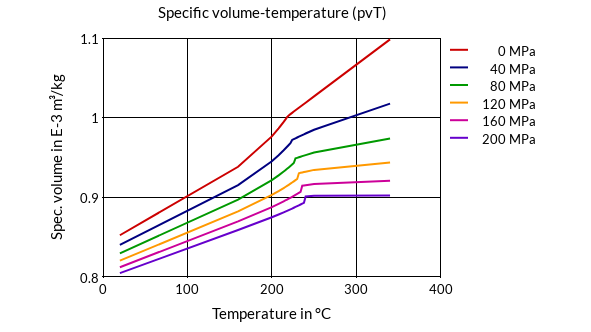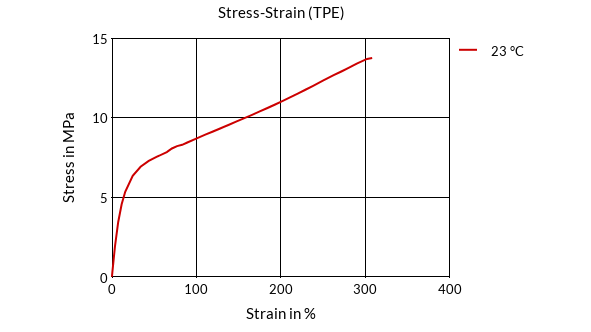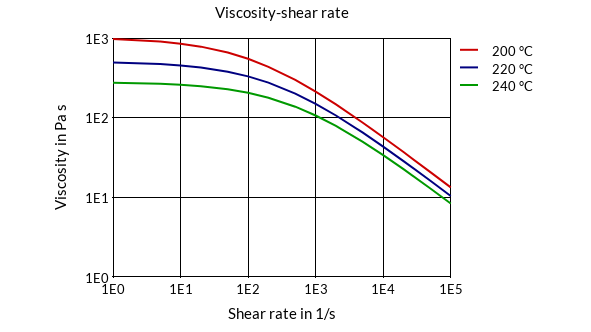Knowde Enhanced TDS
Identification & Functionality
- Chemical Family
- Polymer Name
- Plastics & Elastomers Functions
- Technologies
Features & Benefits
- Labeling Claims
- Materials Features
Applications & Uses
- Applications
- Plastics & Elastomers End Uses
- Plastics & Elastomers Processing Methods
- Railway Pads Application Data
Details
Arnitel® is a thermoplastic co-polyester with a very high temperature resistance. Arnitel® ECO TPC is a biobased alternative.Benefits
- Arnitel® TPC allows for cost effective solutions since it yields thermoplastic processing advantages over rubber, resulting in faster cycle times in compraison with other TPE's
- Arnitel® TPC allows for reliable solutions due to its high abrasion resistance, excellent load bearing capacity, great fatigue, and environmental resistance and due to a very consistent performance over temperature ranges from -55°C (-67°F) to +150°C (+300°F) and longest lifetime to failure as compared to any other rubber or class of TPE's used in this application
- Suit Case Handles Application Data
Details
Arnitel® ECO is a biobased alternative.Benefits
- Arnitel® TPC allows for reliable solutions due to its retention of flexibility even at temperatures down to -40°C or at elevated temperatures up to 100 ˚C
- Arnitel® TPC allows for solutions with nice toch & feel characteristics
- Bed Springs Application Data
Details
Arnitel® has broad portfolio in shore D hardness (38D-74D). So the parts can be molded in a different stiffness/ hardness for different zones of the bed.Benefits
- Arnitel® TPC allows for more design freedom, since due to high flow injection moldable viscosity grades, complex designs can be molded easily
- Arnitel® TPC allow for reliable solutions due to high flexibility in various temperature regimes, excellent colourability and color stability
Properties
- Mechanical Properties
- Thermal Properties
- Electrical Properties
- Other Properties
- Mechanical Properties (Die Cutting)
- Mechanical Properties (TPE)
- Rheological Properties
| Value | Units | Test Method / Conditions | |
| Flexural Modulus | 50 | MPa | ISO 178 |
| Charpy Impact Strength (at +23°C) | N | kJ/m² | ISO 179/1eU |
| Charpy Impact Strength (at -30°C) | N | kJ/m² | ISO 179/1eU |
| Charpy Notched Impact Strength (at +23°C) | N | kJ/m² | ISO 179/1eA |
| Charpy Notched Impact Strength (at -30°C) | N | kJ/m² | ISO 179/1eA |
| Izod Notched Impact Strength (at +23°C) | N | kJ/m² | ISO 180/1A |
| Izod Notched Impact Strength (at -20°C) | N | kJ/m² | ISO 180/1A |
| Izod Notched Impact Strength (at -30°C) | N | kJ/m² | ISO 180/1A |
| Tensile Notched Impact Strength (at +23°C) | 179 | kJ/m² | ISO 8256/1 |
| Value | Units | Test Method / Conditions | |
| Melting Temperature (10°C/min) | 212 | °C | ISO 11357-1/-3 |
| Coefficient of Linear Thermal Expansion (parallel) | 1.5 | E-4/°C | ISO 11359-1/-2 |
| Coefficient of Linear Thermal Expansion (normal) | 1.5 | E-4/°C | ISO 11359-1/-2 |
| Relative Temperature Index (Electrical, 1.5 mm) | 50 | °C | UL746B |
| Relative Temperature Index (Electrical, 3 mm) | 50 | °C | UL746B |
| Relative Temperature Index (with impact, 1.5 mm) | 50 | °C | UL746B |
| Relative Temperature Index (with impact, 3 mm) | 50 | °C | UL746B |
| Relative Temperature Index (without impact, 1.5 mm) | 50 | °C | UL746B |
| Relative Temperature Index (without impact, 3 mm) | 50 | °C | UL746B |
| Value | Units | Test Method / Conditions | |
| Relative Permittivity (100Hz) | 4.7 | — | IEC 62631-2-1 |
| Relative Permittivity (1 MHz) | 4.4 | — | IEC 62631-2-1 |
| Dissipation Factor (100 Hz) | 310 | E-4 | IEC 62631-2-1 |
| Dissipation Factor (1 MHz) | 810 | E-4 | IEC 62631-2-1 |
| Volume Resistivity | 1E12 | Ohm*m | IEC 62631-3-1 |
| Electric Strength | 20 | kV/mm | IEC 60243-1 |
| Comparative Tracking Index | 600 | V | IEC 60112 |
| Value | Units | Test Method / Conditions | |
| Water Absorption | 7 | % | Sim. to ISO 62 |
| Humidity Absorption | 0.4 | % | Sim. to ISO 62 |
| Density | 1160 | kg/m³ | ISO 1183 |
| Value | Units | Test Method / Conditions | |
| Stress at Break (normal) | 20 | MPa | ISO 527-1/-2 |
| Strain at Break (normal) | 880 | % | ISO 527-1/-2 |
| Tear Strength (normal) | 97 | kN/m | ISO 34-1; Method B |
| Tear Strength (parallel) | 93 | kN/m | ISO 34-1; Method B |
| Value | Units | Test Method / Conditions | |
| Tensile Modulus | 44 | MPa | ISO 527-1/-2 |
| Stress at 5% strain | 2.2 | MPa | ISO 527-1/-2 |
| Stress at 10% strain | 4 | MPa | ISO 527-1/-2 |
| Stress at 50% strain | 7 | MPa | ISO 527-1/-2 |
| Stress at 100% strain | 8 | MPa | ISO 527-1/-2 |
| Stress at 300% strain | 11.8 | MPa | ISO 527-1/-2 |
| Stress at Break | 16 | MPa | ISO 527-1/-2 |
| Nominal Strain at Break | 525 | % | ISO 527-1/-2 |
| Shore D Hardness (3s) | 32 | — | ISO 868 |
| Value | Units | Test Method / Conditions | |
| Melt Volume-Flow Rate (at 230 / * °C, 2.16 / * kg) | 31.5 | cm³/10min | ISO 1133 |
| Molding Shrinkage (parallel) | 1.55 | % | Sim. to ISO 294-4 |
| Molding Shrinkage (normal) | 1.75 | % | Sim. to ISO 294-4 |
Regulatory & Compliance
- Certifications & Compliance
- Quality Standards
Technical Details & Test Data
- Chemical Resistance
Chemical Type Chemical Name Resistance Other Acetic acid (10% by mass) at 23°C resistant Ketones Acetone at 23°C resistant Other Ammonium hydroxide (10% by mass) at 23°C limited resistant, tests necessary to verify Other ASTM 1 at 23°C resistant Other ASTM 3 at 23°C resistant Other Brake fluids (DOT 3/4) at 23°C not resistant Other Calcium chloride (10% by mass) at 23°C limited resistant, tests necessary to verify Other Chloroform at 23°C not resistant Ethers Diethyl ether at 23°C limited resistant, tests necessary to verify Alcohols Ethanol at 23°C limited resistant, tests necessary to verify Other Ethyl Acetate at 23°C limited resistant, tests necessary to verify Other Fuel; Diesel at 85°C resistant Other Hydrochloric acid (10% by mass) at 23°C resistant Other Hydrogen peroxide (30% by mass) at 23°C limited resistant, tests necessary to verify Other Nitric acid (10% by mass) at 23°C resistant Other Phosphoric acid (10% by mass) at 23°C resistant Other Sodium hydroxide (10% by mass) at 23°C resistant Other Sulfuric acid (30% by mass) at 23°C resistant Other Tetrachloroethylene at 23°C limited resistant, tests necessary to verify Hydrocarbons Toluene at 23°C resistant Other Transformer oil at 23°C not resistant Other Trichloroethylene at 23°C not resistant Other Water at 23°C resistant Other Zinc chloride (10% by mass) at 23°C resistant - Dynamic Tensile Modulus (E)-Temperature

- Specific Volume-Temperature (pvT)

- Stress-Strain (TPE)

- Viscosity-Shear Rate

Packaging & Availability
- Packaging Type

